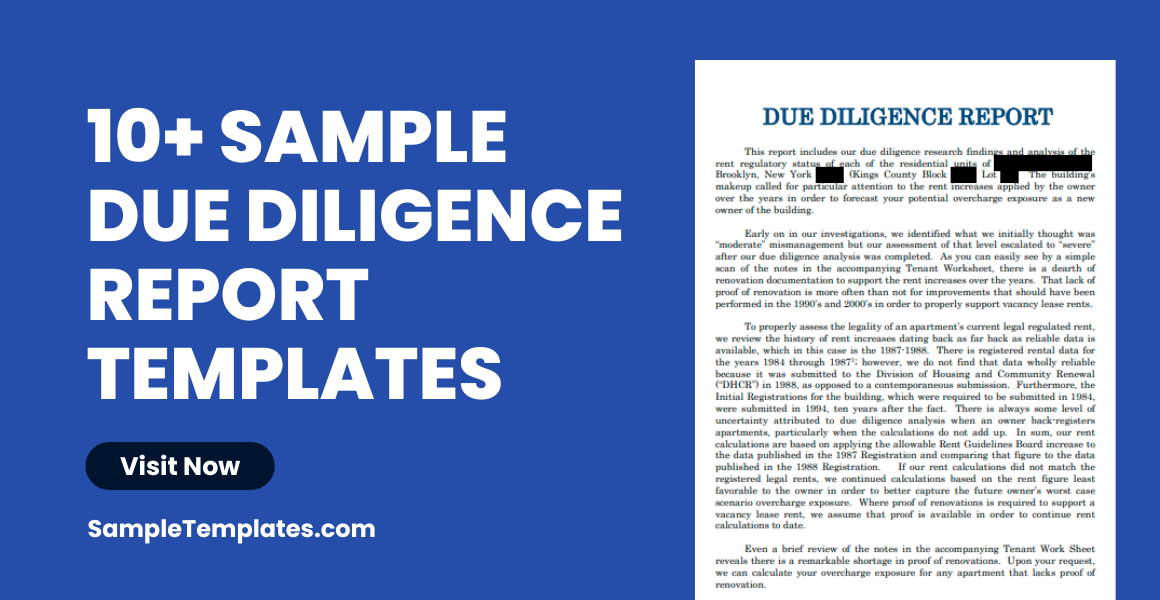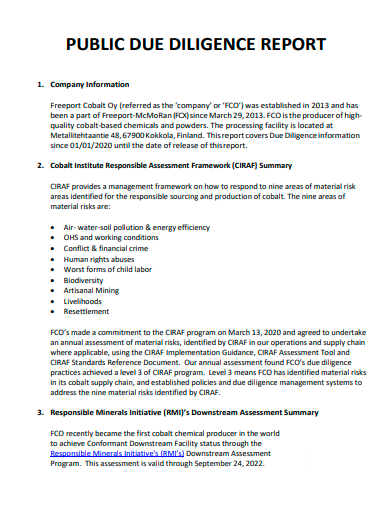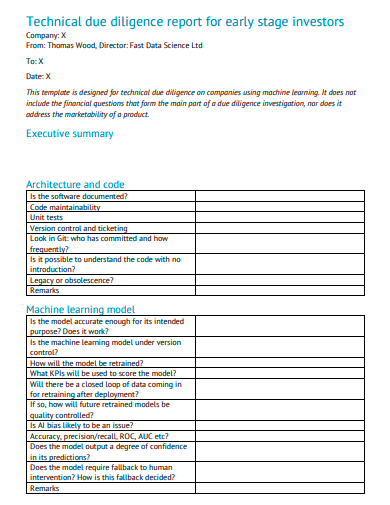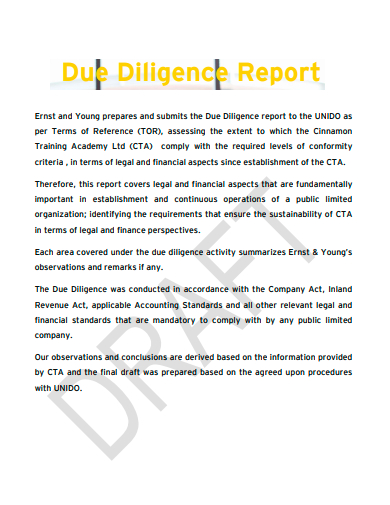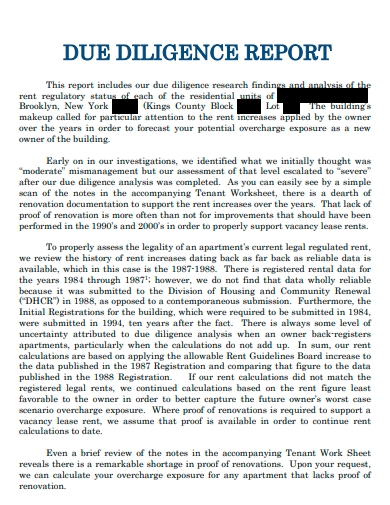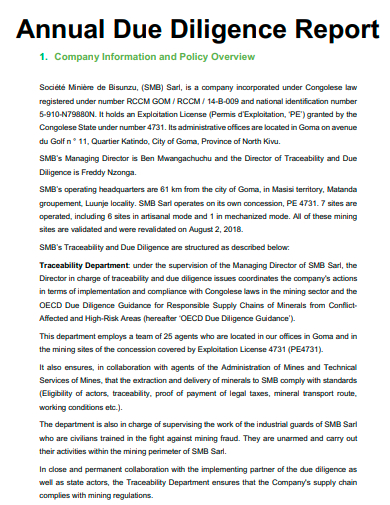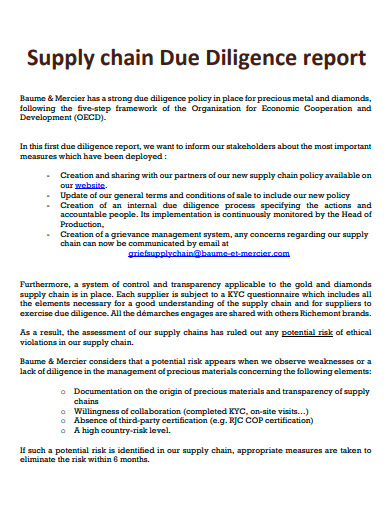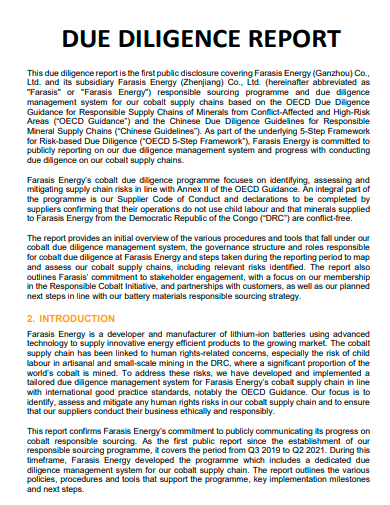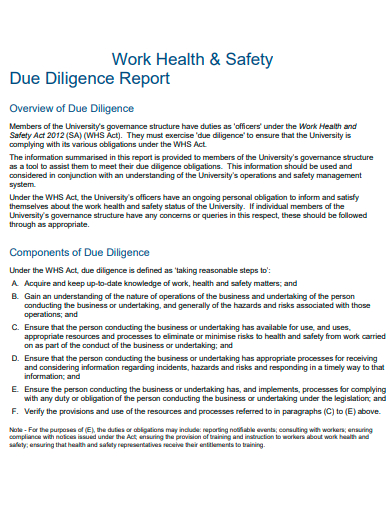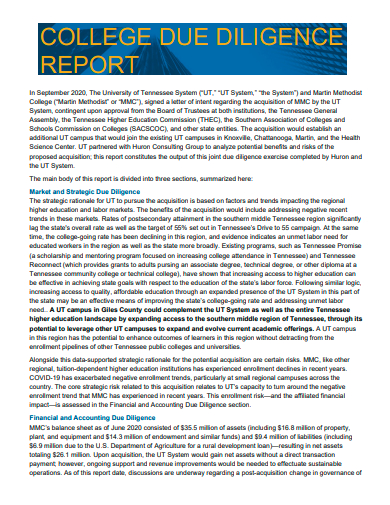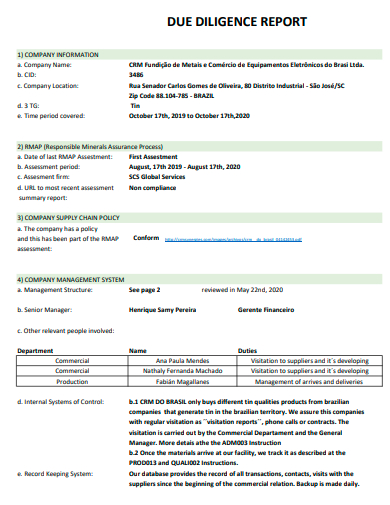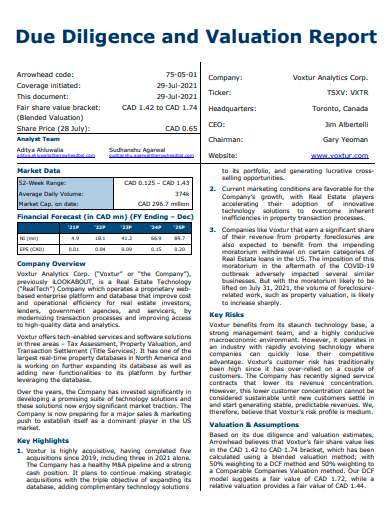Due diligence refers to an investigation, audit, or review conducted to check the reliability of facts or details relevant to a matter under consideration. For financial businesses, due diligence needs an sample evaluation of financial records or financial statements before they can get involved with a business deal proposed by a third party. Due diligence is a systematic process that analyzes and reduces the risk from a decision made for a business or investment deal and is a process that individual investors can conduct on any stock by utilizing available public information.
FREE 10+ Due Diligence Report
1. Public Due Diligence Report
2. Technical Due Diligence Report
3. Draft Due Diligence Report
4. Due Diligence Report Example
5. Annual Due Diligence Report
6. Supply Chain Due Diligence Report
7. Due Diligence Report in PDF
8. Work Health and Safety Due Diligence Report
9. College Due Diligence Report
10. Printable Due Diligence Report
11. Due Diligence and Valuation Report
What is a Due Diligence Report?
A due diligence report is an internal memo or document that is delivered to the important members of the executive team who are involved in evaluating and analyzing a business transaction as well as one of the requirements in closing a deal. This document provides a comprehensive explanation of a property, a business’s financial records, or its overall ranking in the market. With a due diligence report, you can determine the value of a company and enables investors, business partners, and other parties to make more informed decisions relevant to the future of their business.
How to Create a Due Diligence Report?
The practice of due diligence is now common in the United States which requires security dealers and brokers to take responsibility for full disclosure of material information of the items or products they are offering and selling. Failing to do so makes these dealers and brokers accountable for criminal prosecution. Due diligence is mostly used for stocks but can also be utilized for various cases such as bonds, real estate, and other sample forms of investment.
Step 1: Analyze your Company’s Market Capitalization
Your company’s market capitalization refers to its total value which determines how unsteady the stock price is, the scope of ownership, and the possible size of your business’s target market.
Step 2: Determine Profit, Revenue, and Margin Trends
Determining and monitoring the trends of your company’s revenue, profit margins, operating expenses, and return on equity is an important task. An income statement contains a list of your company’s revenue, net income, or profit.
Step 3: Use a Balance Sheet to Determine Assets and Liabilities
Using a consolidated balance sheet will show a company’s assets and liabilities and how much money is available for use. You can also use this sheet to check the level of your company’s debt and compare it to the other companies.
Step 4: Evaluate Short and Long-Term Risks
Be informed of industry-wide risks as well as potential risks for certain companies. Once you have a better understanding of your company’s performance and its ranking in the market, you will be able to make more sound and informed decisions.
FAQs
What are the common reasons for using due diligence reports?
Due diligence reports are often used by real estate investors and developers to identify the potential profitability of a certain property. This document is also used for business valuation purposes which usually focuses on financial statements, financial projections, capital structure, and SWOT analysis. Due diligence reports are also used by companies that are for sale or considering a merger or acquisition of another company.
What are the sections of a due diligence report?
A due diligence report includes sections for a company’s corporate records, financial information, indebtedness, employment and labor, real estate, sample agreements, supplier and customer information, and legal reports or documents.
Who composes a due diligence report?
Due diligence reports usually involve various groups. A company can choose to perform its sample analysis with its corporate development team or hire external consultants such as investment bankers or a due diligence team from an accounting firm.
Due diligence is considered an important business strategy before making any decisions relevant to the business or acquiring another company. A due diligence report is a summary of research and analysis performed during an investigation that was carried out before a financial transaction to enable business owners to evaluate its potential risks and benefits.
Related Posts
Sample Chemistry Lab Reports
School Accomplishment Report Samples & Templates
Field Report Samples & Templates
Sample Science Project Reports
Business Report Samples & Templates
Survey Reports Samples & Templates
Sample Feasibility Reports
Psychological Assessment Report Samples [ Clinical, Child, Intake ]
Report Format Samples & Templates
Acknowledgement for Internship Report Samples [ Hotel, Hospital, Teaching ]
Field Trip Report Samples [ Agriculture, Educational, Environmental ]
Student Counseling Report Samples
Narrative Accomplishment Report Samples [ Science, Teacher, Reading ]
Sample Acknowledgment Report Templates
Internship Narrative Report Samples
